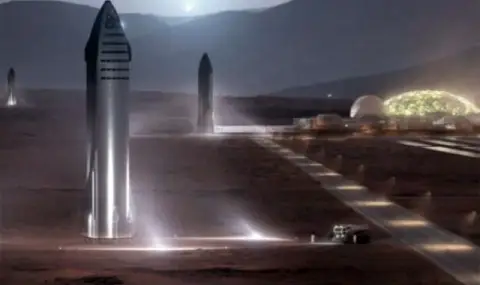During his latest appearance at the Space X launch station in Boca Chica, Texas Elon Musk reiterated his ambitions to colonize Mars. The company's advances in space technology and planned reductions in launch costs, he said, will make it possible to send at least a thousand ships to the Red Planet within about twenty years.
Elon Musk, CEO and Chief Engineer of SpaceX, officially announced his ambitions to colonize Mars to ensure the long-term survival of humanity back in 2016. Although the project still attracts skepticism, it seems to be gaining momentum as SpaceX's space projects move forward. The company has developed a clear plan according to which it will ensure the continuity of the project in the long term. The public-private partnership will fund Starship's rocket systems as well as other equipment needed to establish the first Mars colony.
„All of SpaceX's current programs, including Falcon, Dragon, Starlink and Starship, are integral to developing the technologies needed to make missions to Mars a reality,”, Musk said. During his latest presentation in Boca Chica, Musk also announced progress on the Starship rockets, underscoring how passionately he is committed to pursuing his project.
The company's current update includes “short-term priorities for Starship that will unlock full and rapid reusability of the rockets, which will be a major catalyst for transforming humanity's ability to send ships to Mars. Musk claims that the first colonies that will appear on Mars will not be small and temporary like those that NASA envisages for the Moon, but will have a population of about 1 million people.
According to Musk, some success in this direction can be expected after the launch of the new specialized platform called Mechazilla with giant robotic manipulators, which is planned for May this year. Musk announced that further changes will be made to the design of the rocket itself: the thrust-to-weight ratio of the Raptors engines will be increased to 300 tons from the current 280 tons.
In addition, Space X plans to increase the length of the Starship rocket by 10 meters, which will allow it to transport large payloads weighing up to 200 tons. According to Musk, this will make significant savings in the implementation of this project. Noting the possibility of creating specialized rockets for launching into Earth orbit for the Moon and for Mars, Musk indicated that they would be designed so that they could easily deliver building materials to the Martian colonies.
On the other hand, it envisages the first convoy of spacecraft reassembling and refueling in Earth orbit, waiting for the right moment to begin the flight to Mars. This window occurs every 26 months, which would require 10 launches per day to replenish the first fleet of 1,000 missiles. He then looked at the possibility of building fuel processing plants and creating nuclear power plants on the Red Planet.
However, some experts remain skeptical that a project of this magnitude can be completed in just two decades. Many uncertainties remain, especially regarding its financing, let alone transporting so many people to Mars. Some also oppose the project because of many local dangers, such as the lack of a protective magnetosphere. Questions were also raised about how to solve Earth's problems before considering the possibility of colonizing another planet.
